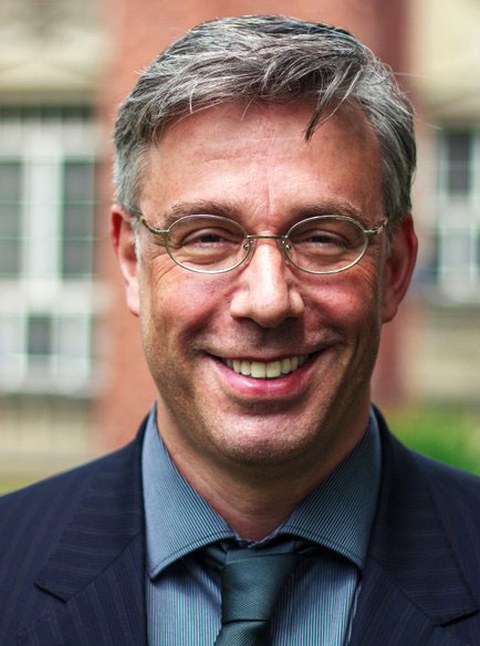Aug 14, 2024
Launch of a degree program unique to Germany
Dagmar Möbius
In October 1998, the first Bachelor’s degree program in International Relations was established at TU Dresden. Its origins were ten years in the making.

Dipl.-Pol. Stefan Robel, Managing Director of the Center for International Studies
“It isn’t easy to establish an interdisciplinary degree program at a German state-run university that involves subjects from different faculties,” says Stefan Robel. The political scientist has been Managing Director of the Center for International Studies since 2005 and takes a look back on his career for Kontakt-online. In 1998, Stefan Robel was an assistant at the Chair of International Politics. Professor Monika Medick-Krakau, who held the Chair, was the initial spokesperson for the new degree program. The Center for International Studies didn’t exist yet. There was only a small office, where the then Managing Director Herbert Sirois worked alongside an employee responsible for foreign language training and a secretary.
Undergraduate and interdisciplinary
The newly introduced Bachelor's degree program was undergraduate and interdisciplinary. It did not follow the classic structure of major and minor subjects, instead each subject was studied on an equal footing. “There was integrated foreign language training with two modern foreign languages; English was compulsory and a second foreign language,” reports Stefan Robel. Just like today, these grades were included in the final Bachelor's degree grade. A third distinctive feature in 1998 before the Bologna reform was introduced were the examinations during the course of study. In addition, a semester abroad was obligatory, which was a unique 25 years ago. Even today, the Center for International Studies ranks in top place alongside the Faculty of Business and Economics in statistics on the recognition of international achievements.
Unique selling point
“Our genuine interdisciplinarity is probably still our unique selling point today,” says Stefan Robel. Applicants to both the Bachelor's and Master's programs in International Relations at TUD often cite the lack of a comparable program at other state universities as the reason for their choice. There are related, partially private degree programs in other German-speaking countries: "St. Gallen is definitely one of the places that are really interdisciplinary, but they teach business administration instead of economics. Then, there is Kleve, a university of applied sciences in North Rhine-Westphalia, which has a very good English-language program, incidentally established there by two of our former colleagues from Dresden.” Even 25 years after it was founded, TU Dresden's Center for International Studies is still leading when it comes to offering a genuinely interdisciplinary range of undergraduate courses in the social sciences.

Students of International Relations from the 2022 and 2023 cohorts on the ‘ERNA’, a trip to Saxon Switzerland organised by the IB Association (to get to know each other)
An appealing program with an above-average success rate
The German-language Bachelor's degree program in International Relations at TUD is highly sought after by high school graduates - almost all of whom apply with an Abitur grade point average of 1.0 to 1.5. 35 to 36 students are admitted to the Bachelor program each year. In the Master's program there are 25 to 30, and this year there are 38 for the first time. Two thirds of students are women – something that has remained constant over the past 25 years. Every year, hundreds of applications are rejected, even though most of them are very good.
Stefan Robel, who is also a student advisor, is regularly asked why this type of course is only available in Dresden. “Because TU Dresden has been able to support the Center for International Studies for all these years. Without such a central steering body with real capacity to take action, you cannot successfully control the development of innovative degree programs over a longer period of time. This is simply not possible across several School and Faculty Boards.” Economics, international law and political science are studied on an equal footing. This results in more intense advice and support than in other degree programs. “Caring for mental health is also a part of our success,” says the Managing Director of the Center for International Relations. “Those who study here are successful in 85 to 90 percent of cases – Both in Bachelor's and Master’s degrees.” By “success rate,” Stefan Robel means graduating within the standard period of study plus two semesters. Most students graduate from their Bacelor’s degree after six semesters. “Because of the high demands, I sometimes advise students to take a little more time. Especially if they are weaker in one of the three subjects,” he says. And he concedes, “The interdisciplinary degree program is not suitable for everyone.” He recommends that some prospective students concentrate on one subject first, alongside minor subjects, and perhaps do an interdisciplinary Master's degree later. However, he says, “There is no one-size-fits-all solution.”
And it must also be said that this degree program is more expensive than other degree programs. Stefan Robel is no stranger to discussions about whether it's too much or too little. And he often answers by asking, “But which alumni do we bring to the university?” He knows that, "Our International Relations degree program at TU Dresden has an incredible reputation." And all this is achieved by a very small Institute.
Contact:
TU Dresden
Center for International Studies
Managing Director (and Alumni Officer) Stefan Robel
